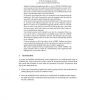Free Online Productivity Tools
i2Speak
i2Symbol
i2OCR
iTex2Img
iWeb2Print
iWeb2Shot
i2Type
iPdf2Split
iPdf2Merge
i2Bopomofo
i2Arabic
i2Style
i2Image
i2PDF
iLatex2Rtf
Sci2ools
102
click to vote
RULES
1995
Springer
1995
Springer
Rule Contexts in Active Databases - A Mechanism for Dynamic Rule Grouping
Engineering applications that use Active DBMSs (ADBMSs) often need to group activities into modes that are shifted during the execution of different tasks. This paper presents a mechanism for grouping rules into contexts that can be activated and deactivated dynamically. The ADBMS monitors only those events that affect rules of activated contexts. By dynamic rule grouping the rules to be monitored can be changed during the transactions. This can be contrasted by static rule grouping where the rules are associated with specific objects during the schema definition. A rule is always activated into a previously defined context. The same rule can be activated with different parameters and into several different contexts. Rules in a context are not enabled for triggering until the context is activated. However, rules can be directly activated by activating them into a previously activated context. When rule contexts are deactivated all the rules in that context are disabled from triggering....
Related Content
| Added | 26 Aug 2010 |
| Updated | 26 Aug 2010 |
| Type | Conference |
| Year | 1995 |
| Where | RULES |
| Authors | Martin Sköld, Esa Falkenroth, Tore Risch |
Comments (0)

